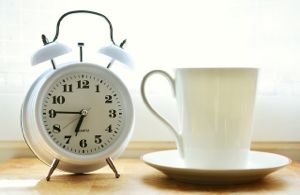~Writing Well Wednesday Tip~
If you’re a night owl writer, be prepared for some bad news.
A recent study suggests that you may not live as long as your early-bird friends.
Researchers followed over 430,000 people aged 38 to 73 for six-and-a-half years, and found that night owls—those who prefer to stay up later at night and get up later in the morning—are 10 percent more likely to live a shorter lives than those who jump up first thing rearing to go.
The researchers also noted that in previous studies, night owls were also found to have higher risks of obesity, high blood pressure, and cardiovascular disease, as well as diabetes, depression, and neurological disorders.
Why Do Night Owls Suffer More Health Problems?
Why all the problems? Scientists aren’t sure. What they do know is that we each have an inherent “chronotype,” which is a tendency to prefer certain times of day. No matter whether you prefer morning or night, you were likely born with that tendency. It’s in your genes. Your body prepares for sleep when its ready, not according to a time on the clock.
Researchers believe that this internal body clock is important to overall health, and that disruptions to it can cause problems. The study authors wrote, “Our bodies have their own internal time-keeping system, or clock. This clock would keep running even if a person were removed from the world and hidden away in a dark cave. We believe these internal clocks play an important role in health by anticipating the time of day and preparing the body accordingly.”
Scientists do have some theories as to why night owls may be more vulnerable to disease and perhaps, to early death:
- Staying up later may allow them to use more drugs and alcohol.
- Being awake while others are asleep can lead to feelings of loneliness and depression, which have definite health consequences.
- Night owls trying to live in a world of early birds could be continuously going against their internal clocks.
 Night Owls Often Forced to Live in an Early Bird World
Night Owls Often Forced to Live in an Early Bird World
It seems that so far, theory number three is the most likely cause of health issues in night owls who aren’t drinking, using drugs, or suffering from depression. After all, most of the world is scheduled around the early bird’s preferred times, and often night owls have to fit themselves into these times whether they like it or not.
That can mean waking up earlier than the body is ready to, going to sleep earlier (and suffering sleep problems), eating at times when the body isn’t ready for it, and more. It’s like living in a world that just isn’t made for you.
“A night owl trying to live in a morning lark world will struggle,” the researchers wrote in The Conversation. “Their job may require early hours, or their friends may want to have an early dinner, but they themselves prefer later times for waking, eating, socializing and sleep. This mismatch could lead to health problems in the long run.”
The researchers recommended that employers be more flexible in their required work hours. “If you can recognize these (types) are, in part, genetically determined and not just a character flaw,” Knutson said, “jobs and work hours could have more flexibility for owls. They shouldn’t be forced to get up for an 8:00 a.m. shift.”
How Night Owl Writers Can Protect Their Health
If you’re a night-owl writer, this is likely unsettling news. Fortunately, you can take steps to protect your health:
- Gradually change your internal clock: Some experts believe that while your chronotype is in your genes, you can change it if you go at it gradually. Try going to bed just 10-15 minutes earlier each night until you reach your target time. Going to bed an hour earlier or more is likely to result in sleep problems, so take it slow. Once you’ve established the new habit, stick with it, even on weekends.
- Ask for flexibility: If you have specific work hours, ask for increased flexibility. Maybe you can go in a half-hour later, or take on a different shift.
- Follow healthy sleep practices: Don’t take your cell phone, tablet, or computer to bed (read our post for the reasons why), and dim the lights at least an hour before bedtime.
- Don’t skip breakfast: Some studies have indicated that early risers tend to eat healthier breakfasts, which may give them a health advantage. When you eat more calories earlier in the day, you burn them off more easily. Often night owls get into late-night snacking, which increases the risk of weight gain and other related problems. Eat a good breakfast, and if you’re staying up late, avoid the munchies by drinking plenty of water, or having a low-cal snack that won’t pad your waistline.
- Expose yourself to light early on: As soon as you get up, expose yourself to natural light if possible. It will help jumpstart your internal clock.
Are you a night-owl writer forced to live in an early-bird world?
Sources
“Bad News for Night Owls: Late risers may die sooner, study finds,” CBS news, April 12, 2018, https://www.cbsnews.com/news/bad-news-for-night-owls-late-risers-may-die-sooner-study-finds/.
Knutson, K. L., & Von Schantz, M. (2018). Associations between chronotype, morbidity and mortality in the UK Biobank cohort. Chronobiology International, 1-9. doi:10.1080/07420528.2018.1454458
Knutson, K., & Von Schantz, M. (2018, April 13). Bad News, Night Owls: You Might Have a Higher Risk of Dying Early. Retrieved from https://www.smithsonianmag.com/science-nature/night-owls-may-have-10-percent-higher-risk-early-death-study-says-180968785/
Malcolm von Schantz. (2018, April 12). Night owls may have 10 percent higher risk of early death, study says. Retrieved from https://theconversation.com/night-owls-may-have-10-percent-higher-risk-of-early-death-study-says-94810?xid=PS_smithsonian

